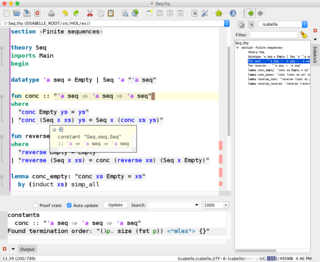 W
WIn computer science and mathematical logic, a proof assistant or interactive theorem prover is a software tool to assist with the development of formal proofs by human-machine collaboration. This involves some sort of interactive proof editor, or other interface, with which a human can guide the search for proofs, the details of which are stored in, and some steps provided by, a computer.
 W
WAgda is a dependently typed functional programming language originally developed by Ulf Norell at Chalmers University of Technology with implementation described in his PhD thesis. The original Agda system was developed at Chalmers by Catarina Coquand in 1999. The current version, originally known as Agda 2, is a full rewrite, which should be considered a new language that shares a name and tradition.
 W
WCoq is an interactive theorem prover first released in 1989. It allows for the expression of mathematical assertions, mechanically checks proofs of these assertions, helps to find formal proofs, and extracts a certified program from the constructive proof of its formal specification. Coq works within the theory of the calculus of inductive constructions, a derivative of the calculus of constructions. Coq is not an automated theorem prover but includes automatic theorem proving tactics (procedures) and various decision procedures.
 W
WF* is a functional programming language inspired by ML and aimed at program verification. Its type system includes dependent types, monadic effects, and refinement types. This allows expressing precise specifications for programs, including functional correctness and security properties. The F* type-checker aims to prove that programs meet their specifications using a combination of SMT solving and manual proofs. Programs written in F* can be translated to OCaml, F#, and C for execution. Previous versions of F* could also be translated to JavaScript.
 W
WThe Isabelle automated theorem prover is an interactive theorem prover, a higher order logic (HOL) theorem prover. It is an LCF-style theorem prover. It is thus based on a small logical core (kernel) to increase the trustworthiness of proofs without requiring explicit proof objects.
 W
WThe KeY tool is used in formal verification of Java programs. It accepts specifications written in the Java Modeling Language to Java source files. These are transformed into theorems of dynamic logic and then compared against program semantics that are likewise defined in terms of dynamic logic. KeY is significantly powerful in that it supports both interactive and fully automated correctness proofs. Failed proof attempts can be used for a more efficient debugging or verification-based testing. There have been several extensions to KeY in order to apply it to the verification of C programs or hybrid systems. KeY is jointly developed by Karlsruhe Institute of Technology, Germany; Technische Universität Darmstadt, Germany; and Chalmers University of Technology in Gothenburg, Sweden and is licensed under the GPL.
 W
WMatita is an experimental proof assistant under development at the Computer Science Department of the University of Bologna. It is a tool aiding the development of formal proofs by man-machine collaboration, providing a programming environment where formal specifications, executable algorithms and automatically verifiable correctness certificates naturally coexist.
 W
WThe Mizar system consists of a formal language for writing mathematical definitions and proofs, a proof assistant, which is able to mechanically check proofs written in this language, and a library of formalized mathematics, which can be used in the proof of new theorems. The system is maintained and developed by the Mizar Project, formerly under the direction of its founder Andrzej Trybulec.
 W
WThe Prototype Verification System (PVS) is a specification language integrated with support tools and an automated theorem prover, developed at the Computer Science Laboratory of SRI International in Menlo Park, California.